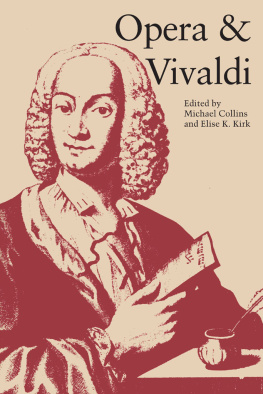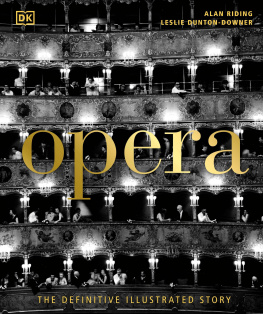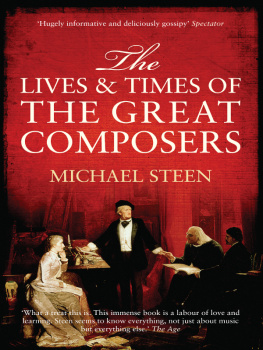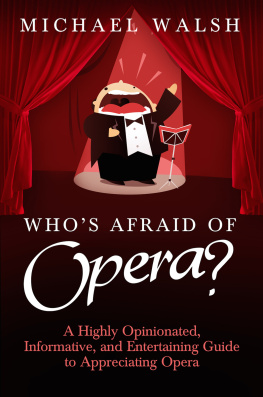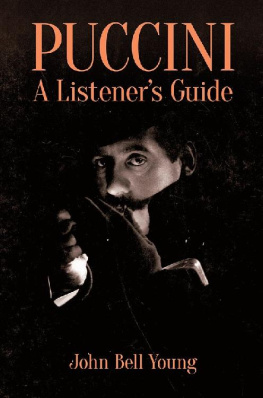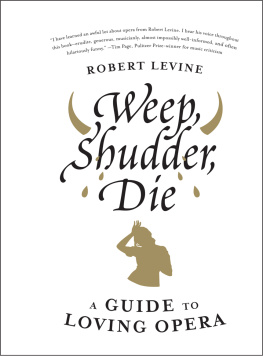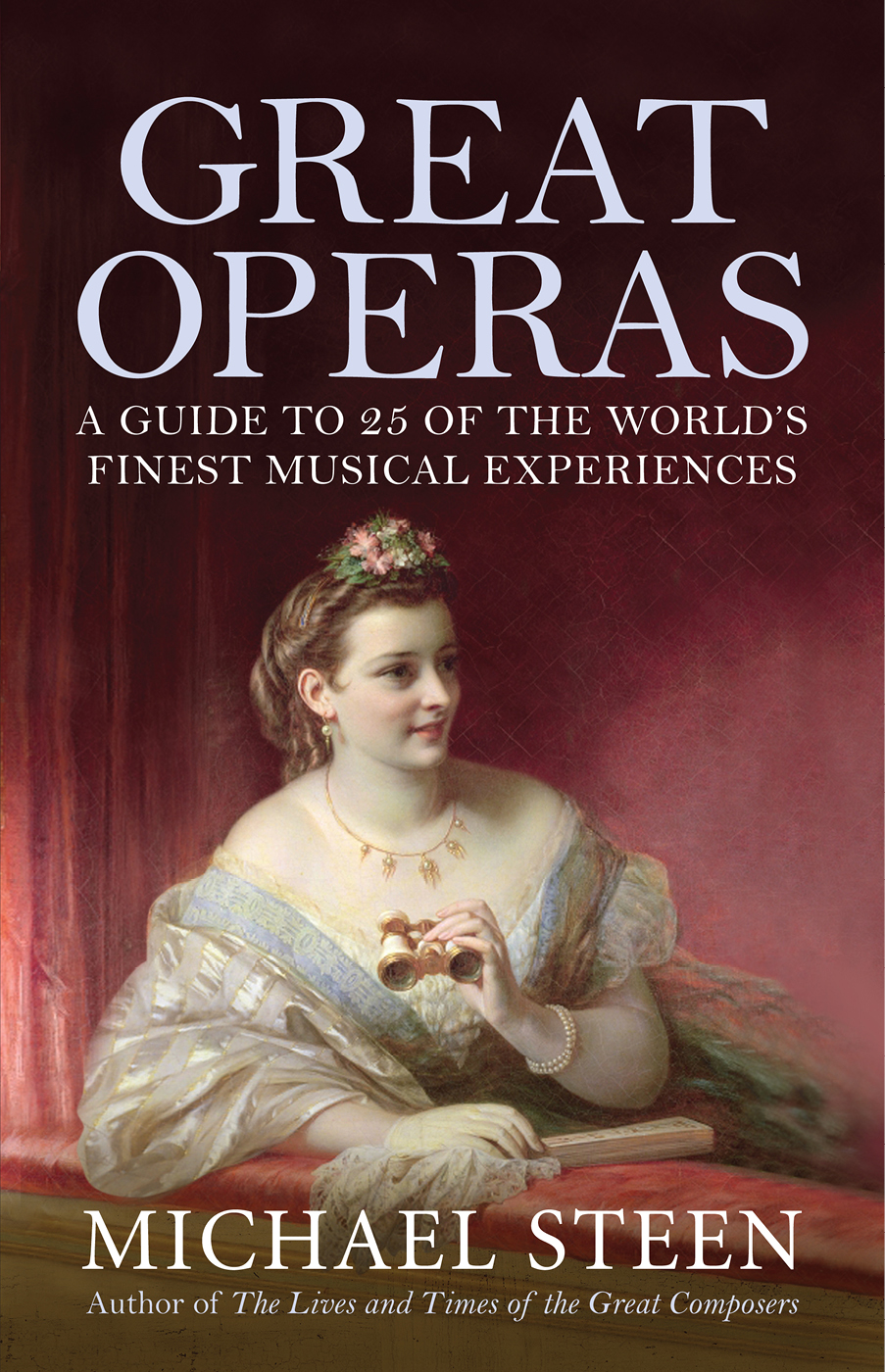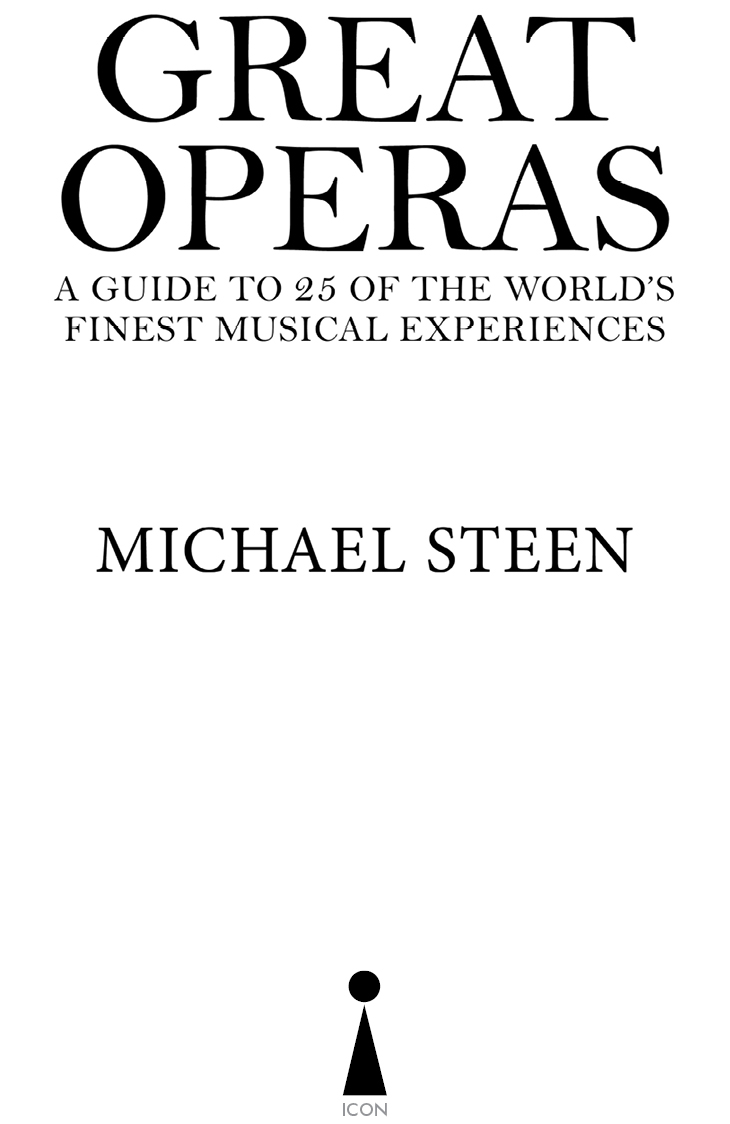Some of the material in this book has previously been published in a series of individual ebooks, each titled A Short Guide to a Great Opera.
The author has asserted his moral rights.
No part of this book may be reproduced in any form, or by any means, without prior permission in writing from the publisher.
P REFACE
Were off to the opera in a couple of days, Rosemary reminded me. Im rather busy. Tell me what I need to know. She added, Well want a drink when we get there. So I wont have time to read much of the programme. By the way, she continued, Kate and John know all about opera and I want to hold my own with them during the interval.
Ill write you a short guide, something informative, but light and amusing, which will help you; you can read the key information in the car, I promised.
It worked so well that every time we went to an opera I gave her and her knowledge of the technicalities is that of a typical BBC Radio 4 or Classic FM listener who learnt piano at school a similar guide. I structured each so that she could get up front the key information on the operas background and what it is about. She could then drill down if she wanted more information.
Having been to so many operas, and consequently having so many such guides at my fingertips, it has been a challenge choosing which to include in this compendium. I have concentrated on well-known favourites. This means that the operas of Mozart are bound to be well represented. And the contents are necessarily dominated by 19th-century Italian opera, in style, if not always by date.
The popularity of many of the Italian and French operas arises to a considerable extent from the impressive vocal pyrotechnics and gymnastics which enable celebrities, or would-be celebrities, to show off. Verdi, but more notably the Germans to the north, developed a more serious purpose to which the composer Hector Berlioz (who regarded himself as three-quarters German) applied the phrase un peuleve, that is, lofty or noble. They aimed to use music, both vocal and orchestral, to express the drama more effectively than the spoken word on its own could do. So, to reflect this, and to provide breadth, I have supplemented the popular operas with an early and a mature opera by Wagner. As a Dubliner, I would have liked to be able to include something with an Irish flavour. But accepting that Benedicts The Lily of Killarney and Stanfords Shamus OBrien fell out of the repertory long ago, I settled for starting and ending with guides to well-known operas by Handel and Britten, both essentially English composers.
The guides vary in length. There is much more to say about Tristan und Isolde than there is about LElisir dAmore. Besides, the length of the opera itself varies: the Italians, so commercially astute, knew exactly what their impatient audiences would tolerate. Verdi reckoned that 40 minutes was the maximum attention span for an act.
I have been keen to ensure that, for practical use, the reader has all the information he or she needs together in one place, in a stand-alone piece without too much cross-referencing. So it is inevitable that at times there will be some duplication between guides it should come as no surprise that certain useful knowledge relating to one Puccini opera will be similarly valuable with regard to another. Conversely, biographical box features, which appear in the first guide for each composer, are not repeated in subsequent guides. And the same applies, occasionally, for librettists and other important figures.
In the original language, the first lines of certain arias and choruses can be important and useful milestones. But the translation of the first line of a verse is often not very meaningful, taken on its own. So I have often relied on the surrounding description to convey the overall meaning. I have also assumed that even though most readers do not have a glossary of musical expressions at their fingertips, they have encountered enough Italian waiters to know or guess what many phrases are likely to mean. Most operas are about love.
Some old hands may be disappointed not to see discographies. They can be obtained today at the touch of a button. The efficient and up-to-date way to see what is available is to refer to the internet.
I have drawn the information from my own considerable experience and from various authoritative sources listed in the acknowledgments. Without all these, without the team at Icon, Duncan Heath, Robert Sharman and Andrew Furlow, this book and the accompanying ebook series of Short Guides to a Great Opera would not exist. More crucially perhaps, without the great composer, we would not have the opera. To my sources (and Rosemary and the others who have helped me, including Richard Todd and Katharine Hogg on photography, and Dr Guy Deutscher, Dr Janie Steen and David Vaughan on a host of other matters), I am very grateful. I am also indebted to the staff of various libraries, especially the British Library, the City of London Libraries and the City of Westminster Music Library. Their courtesy, helpfulness and responsiveness never cease to astonish me.
* * *
Andrew Porter, the leading 20th-century critic, tactfully drew attention to contradictory trends today: on the one hand, ever greater fidelity to the sounds of a composers score, and, on the other, ever less respect for scenic indications that might be considered part of the composers overall creation, his complete, integrated work of art.
These guides help you to appreciate the opera the composer wrote. They cannot anticipate a particular production which is not in line with the composers original intentions. (Sometimes these are so ignored that I wonder whether the advertising, which holds the work out as being that of the composer, complies with local regulations on trade description.) Maybe the opera-house programme will indicate the thinking behind a particular production.
Rosemary and many friends have found these guides very helpful. I hope you do as well, and have a very enjoyable musical experience.
Michael Steen
Mattingley
H ANDEL : G IULIO C ESARE
T HE OPERA AND ITS COMPOSER
Today, Handels opera about Cleopatra, the immortal harlot, is the most popular of the 40 or so Italian operas that were his focus during the first part of his career, before he took up composing oratorios. No Handel opera has been staged in so many countries or enjoyed greater success.
We may be surprised that Giulio Cesare in Egitto was composed in Italian by a German resident in England. Handels contemporaries were amused by this fashion for Italian opera, which could be heard twice a week, starting exactly at Six. Such was the enthusiasm that The Spectator, a newly launched journal, feared that future historians might infer that the English spoke Italian. An extraordinary notion! Otherwise, how would the journalists great grandchildren possibly explain why their Forefathers used to sit like an audience of Foreigners in their own Country in order to hear whole Plays acted before them in a Tongue which they did not understand?


